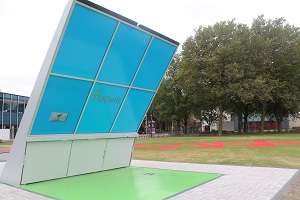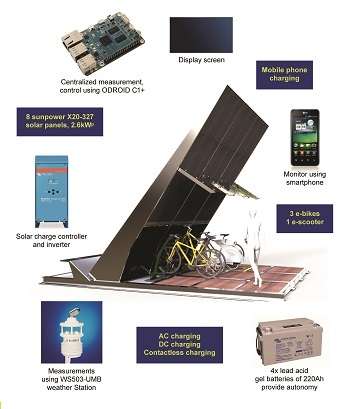First solar-powered wireless charging station for electric bikes

On Wednesday, 12 October, Executive Board President Tim van der Hagen, Dean of the Faculty of Electrical Engineering, Mathematics and Computer Science Rob Fastenau, Head of the Department of Electrical Sustainable Energy Miro Zeman, and Pavol Bauer, who leads the Direct Current (DC) Systems, Energy Conversion & Storage group, presented the first solar-powered wireless charging station for electric bikes.
Pavol Bauer said, "This is a major step forward in terms of sustainable transport and accelerating the energy transition because the combination of solar energy, wireless charging and electric bikes is unique. In this charging station, we charge the DC battery in the bike with the solar energy from the eight solar panels via the DC supply. The charging station can also store 10 kWh of solar energy in the batteries, enabling it to function independently."
Practice and research
The charging station is ready for immediate use: it can accommodate four electric bikes, an electric scooter and a research bike that are charged wirelessly. The charging station also serves as a living lab, a testbed for further research. In the last two years, ten students have graduated on the strength of their work on the project. For example, a student of Electrical Engineering, Mathematics and Computer Science designed a DC system and created a system to enable the bike to be charged wirelessly, another calculated and determined the output and position of the solar panels, and an Industrial Design Engineering student was responsible for designing the charging station.

How it works
The electric research bike is equipped with a dual stand and a small coil. At the charging station, the bike can be parked on the stand on a magnetic tile. The bike is charged directly via the coil. The user can monitor the charging status on a built-in screen on the charging station or on his or her mobile phone. Wireless charging takes around the same time as the 'conventional' charging of electric bikes.
It is anticipated that the eight panels will generate sufficient energy to power the electric bikes and the scooter in winter. In summer, any excess power will be fed to the electricity grid. Pavol Bauer's group now plans to work on the further development of wireless charging for various bikes and scooters. The ultimate aim is for the charging station to consist solely of several tiles used as a solar panel, which can be cycled on, known as solar roads. Integrating solar cells and the wireless charging system makes an expensive system unnecessary.
More information: More information can be found on www.solarpoweredbikes.tudelft.nl
Provided by Delft University of Technology





















